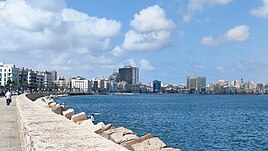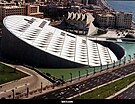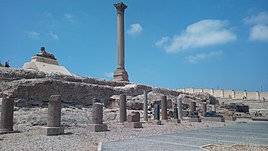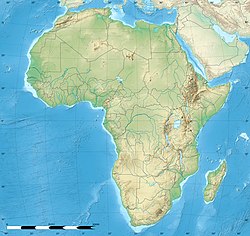
Back Alexandrië Afrikaans Alexandria ALS እስክንድርያ Amharic Aleixandría AN Alikisendira ANN الإسكندرية Arabic ܐܠܟܣܢܕܪܝܐ ARC لإسكندرية ARY اسكندريه ARZ Alexandría AST
Alexandria
الإسكندرية (Arabic)
Αλεξάνδρεια (Greek)
| |||||||||
|---|---|---|---|---|---|---|---|---|---|
| Nicknames: Mediterranean's Bride, Pearl of the Mediterranean, Alex | |||||||||
| Coordinates: 31°11′51″N 29°53′33″E / 31.19750°N 29.89250°E | |||||||||
| Country | Egypt | ||||||||
| Governorate | Alexandria | ||||||||
| Founded | 331 BC | ||||||||
| Founded by | Alexander the Great | ||||||||
| Government | |||||||||
| • Governor | Ahmed Khaled Hassan Said[2] | ||||||||
| Area | |||||||||
• Total | 1,661 km2 (641 sq mi) | ||||||||
| Elevation | 5 m (16 ft) | ||||||||
| Population (2024) | |||||||||
• Total | 5,696,130[1] | ||||||||
| • Density | 3,670/km2 (9,500/sq mi) | ||||||||
| Demonyms | Alexandrian, Alexandrine (Arabic: إسكندراني) | ||||||||
| GDP | |||||||||
| • Metro | EGP 566 billion (US$ 36 billion) | ||||||||
| Time zone | UTC+2 (EGY) | ||||||||
| • Summer (DST) | UTC+3 | ||||||||
| Postal code | 21xxx | ||||||||
| Area code | (+20) 3 | ||||||||
| Website | alexandria.gov.eg | ||||||||
Alexandria (/ˌælɪɡˈzændriə, -ˈzɑːn-/ AL-ig-ZA(H)N-dree-ə;[4] Arabic: الإسكندرية;[a] Ancient Greek: Ἀλεξάνδρεια,[b] Coptic: Ⲣⲁⲕⲟϯ - Rakoti or ⲁⲗⲉⲝⲁⲛⲇⲣⲓⲁ) is the second largest city in Egypt and the largest city on the Mediterranean coast. It lies at the western edge of the Nile River delta. Founded in c. 331 BC by Alexander the Great,[8] Alexandria grew rapidly and became a major centre of Hellenic civilisation, eventually replacing Memphis, in present-day Greater Cairo, as Egypt's capital. Called the "Bride of the Mediterranean" internationally,[9] Alexandria is a popular tourist destination and an important industrial centre due to its natural gas and oil pipelines from Suez.
The city extends about 40 km (25 mi) along the northern coast of Egypt and is the largest city on the Mediterranean, the second-largest in Egypt (after Cairo), the fourth-largest city in the Arab world, the ninth-largest city in Africa, and the ninth-largest urban area in Africa.
The city was founded originally in the vicinity of an Egyptian settlement named Rhacotis (that became the Egyptian quarter of the city). Alexandria grew rapidly, becoming a major centre of Hellenic civilisation and replacing Memphis as Egypt's capital during the reign of the Ptolemaic pharaohs who succeeded Alexander. It retained this status for almost a millennium, through the period of Roman and Eastern Roman rule until the Muslim conquest of Egypt in 641 AD, when a new capital was founded at Fustat (later absorbed into Cairo).
Alexandria was best known for the Lighthouse of Alexandria (Pharos), one of the Seven Wonders of the Ancient World; its Great Library, the largest in the ancient world; and the Catacombs of Kom El Shoqafa, one of the Seven Wonders of the Middle Ages. Alexandria was the intellectual and cultural centre of the ancient Mediterranean for much of the Hellenistic age and late antiquity.[8] It was at one time the largest city in the ancient world before being eventually overtaken by Rome.
The city was a major centre of early Christianity and was the centre of the Patriarchate of Alexandria, which was one of the major centres of Christianity in the Eastern Roman Empire. In the modern world, the Coptic Orthodox Church and the Greek Orthodox Church of Alexandria both lay claim to this ancient heritage. By 641, the city had already been largely plundered and lost its significance before re-emerging in the modern era.[10] From the late 18th century, Alexandria became a major centre of the international shipping industry and one of the most important trading centres in the world, both because it profited from the easy overland connection between the Mediterranean and Red Seas and the lucrative trade in Egyptian cotton.
- ^ "Alexandria 2024".
- ^ "Alexandria Governor".
- ^ "GDP BY GOVERNORATE", mped.gov.eg
- ^ "Alexandria". Collins Dictionary. n.d. Archived from the original on 11 June 2015. Retrieved 24 September 2014.
- ^ "Travel in Egypt: Alexandria". Arab Academy. 10 August 2016. Archived from the original on 25 July 2020. Retrieved 19 May 2020.; Fideler, David (1 January 1993). Alexandria 2. Red Wheel/Weiser. ISBN 978-0-933999-97-8. Archived from the original on 18 April 2021. Retrieved 8 November 2020.
- ^ Michael Haag (2004). Alexandria: City of Memory. Yale University Press. ISBN 978-0-300-10415-8. Archived from the original on 18 April 2021. Retrieved 19 May 2020.
- ^ Fowden, Garth (26 February 2019). "Alexandria between Antiquity and Islam". Millennium Jahrbuch. Apollo-University of Cambridge Repository. doi:10.17863/CAM.37202. Archived from the original on 8 February 2021. Retrieved 19 May 2020.
- ^ a b Justin Pollard; Howard Reid (30 October 2007). The Rise and Fall of Alexandria: Birthplace of the Modern World. Viking. p. 2-7. ISBN 978-0-14-311251-8.
- ^ "Egypt's 'bride of the Mediterranean' is a year-round destination for tourists | Marwa al-A'sar". AW. Archived from the original on 18 November 2021. Retrieved 18 November 2021.
- ^ "The Lighthouse Dims". Foreign Policy. 23 December 2014. Archived from the original on 9 March 2017. Retrieved 5 March 2017.
Cite error: There are <ref group=lower-alpha> tags or {{efn}} templates on this page, but the references will not show without a {{reflist|group=lower-alpha}} template or {{notelist}} template (see the help page).









